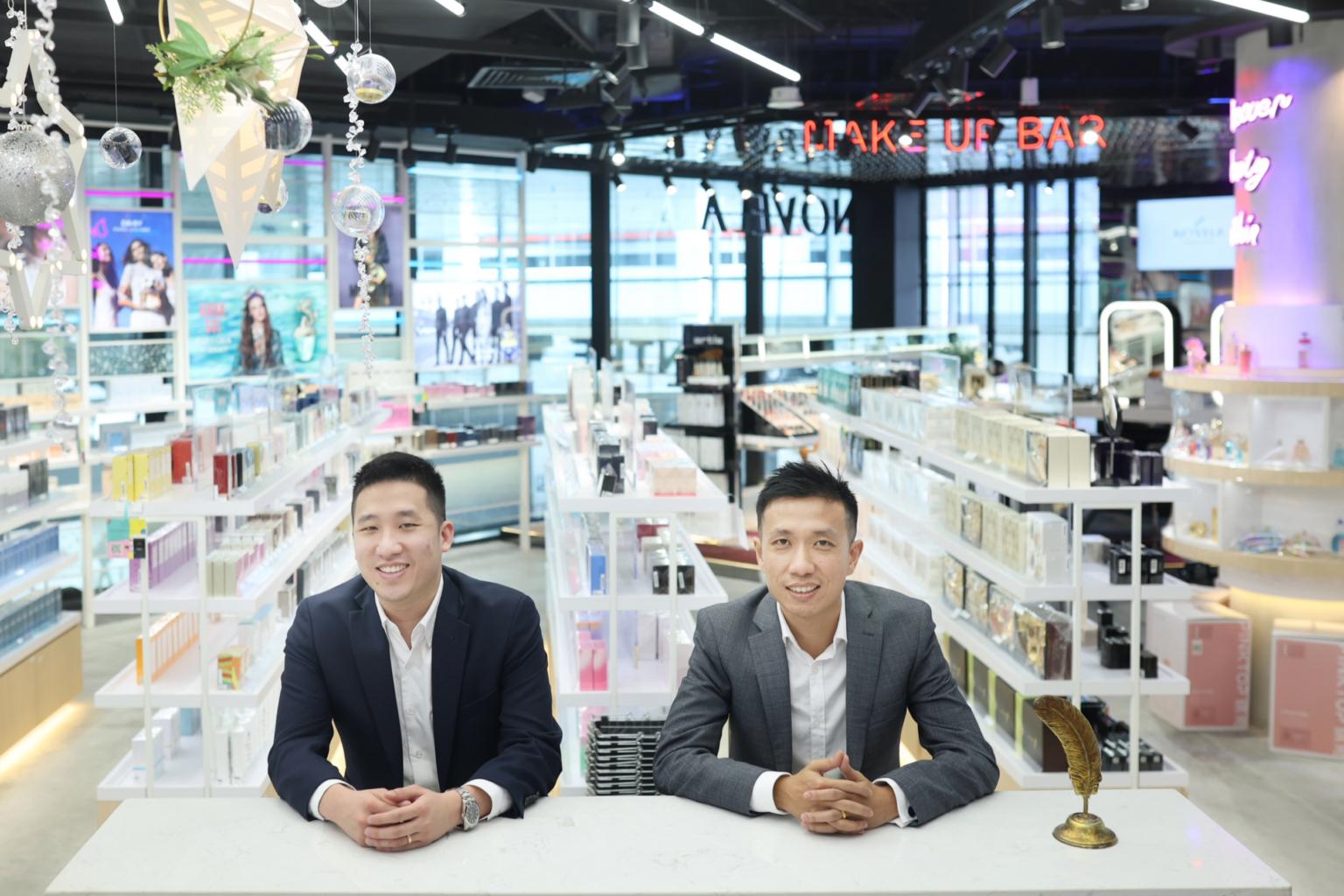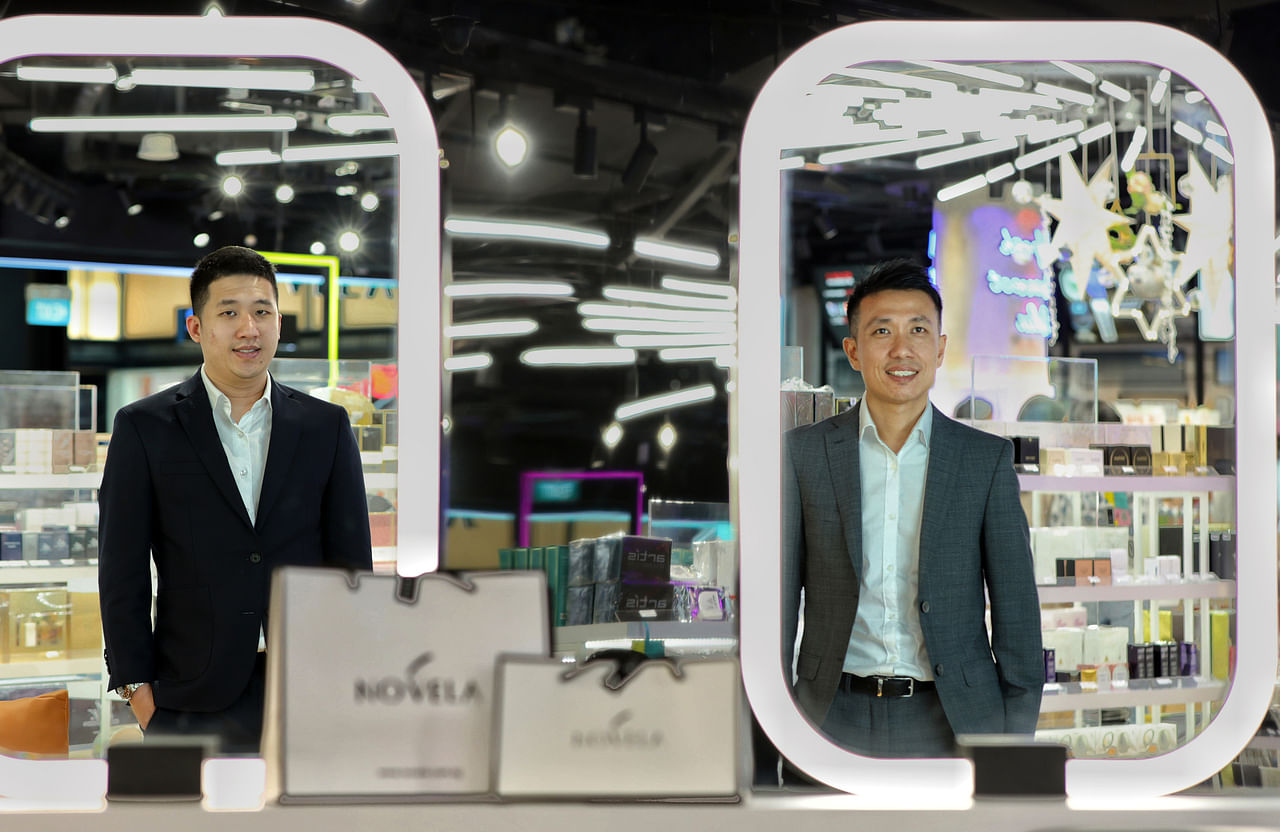Prospering in the pandemic: Home-grown beauty chain targets the big boys
While some businesses are just surviving during the pandemic, these three companies are thriving, thanks to guts, grit and good timing.
Sign up now: Get ST's newsletters delivered to your inbox

Novela co-founders Eugene Tay (left) and Ben Lin at the beauty store chain's Singpost Centre outlet.
PHOTO: NOVELA
SINGAPORE - Many students use vacation jobs to earn pocket money.
Classmates Ben Lin and Eugene Tay, though, parlayed their holiday job peddling fragrances in a mall into a multi-million-dollar beauty business that seems to be pandemic-proof.
Despite having to close their four Novela stores during the circuit breaker, the co-founders accelerated plans to move the business online.
In less than four weeks, Mr Lin, 35, and Mr Tay, 31, launched an e-commerce website in May last year.
Their move to Kaola, a cross- border digital shopping platform owned by the Alibaba Group, in January last year also proved fortuitous.
Novela achieved more than 10 million yuan (S$2 million) in sales from that source alone, about half of which was achieved on the wildly popular shopping day known as Double Eleven Singles' Day on Nov 11. It is looking to double that figure this year.
Its sales in China bumped up its total revenue last year to $18 million, which pipped 2019's $13 million, and its staff numbers rose 18 per cent to 138. Novela is part of their Henatenn Holdings beauty distribution and export group, which recorded revenue of $130 million last year, up from $100 million pre-Covid-19.
Their company's performance mirrors the robustness of the beauty industry, which is worth more than US$500 billion (S$673 billion) a year globally, according to a McKinsey consultancy report, How Covid-19 Is Changing The World Of Beauty.
Published in May last year, the report noted: "Consumers across the globe are showing by their actions that they still find comfort in the simple pleasures of a 'self-care Sunday' or a swipe of lipstick before a Zoom meeting."
Mr Lin and Mr Tay met in 2008 while studying business information technology in Temasek Polytechnic.
They were intrigued enough by their vacation stint to dabble in product distribution, and ran a fragrance pushcart in their school. Mr Lin had also become excited after seeing the huge demand for beauty in China during an internship in Shanghai.
"At that time, we were just having fun. We didn't really treat it as a business," he says.
After graduating, they decided to plunge into entrepreneurship by incorporating a beauty distribution business, working every day of the week from a 300 sq ft space borrowed from Mr Tay's mother, who ran a corporate gift firm.
In 2013, having built up their work and accumulated some reserves, they ventured into the retail beauty scene, which is dominated by foreign names such as Watsons, Guardian and Sephora.
Their optimism was fuelled by the observation that Hong Kong, a city-state like Singapore with a similar population, has several home-grown beauty store brands like Sasa, while there were none here.
They chose the name Novela, which means "novel" in Spanish, with a quill as their logo to reflect their belief that beauty is more than just looking pretty and includes intelligence and elegance, Mr Lin says.
However, their first store at Suntec City was a costly education in the business-to-consumer segment, netting a loss of close to $500,000 over its three-year lease.

Their move to outlet mall IMM in Jurong better suited the brand's positioning as a premium beauty retailer - between the mass-market and luxury beauty segments - and attracted the attention of mainland Chinese tourists shopping there.
"We started to engage China consumers using our WeChat marketing tools, which none of the (other) companies used during that time," Mr Tay says, adding that they also reached out to mainland Chinese working or studying here.
Collectively, this group formed the "first wave of members".
As a new player, it wanted to avoid direct competition with beauty giant Sephora and department stores with established beauty halls like Tangs and the former Robinsons. So, Novela took a decidedly different approach.
Besides choosing WeChat over Facebook or Instagram, it set up stores in neighbourhood malls like Northpoint City and SingPost Centre rather than Orchard Road, as these yielded better return on investment. Novela carries more than 100 brands, including up to 15 exclusive ones.
A key to its success is its membership-only model, much like how American supermarket chain Costco operates in comparison with its rival, Walmart, says Mr Lin.
Novela has some 150,000 members locally, and an additional but fast-growing 150,000 members in China after one year there.
"With 99 per cent registration, we are able to trace back 99 per cent of transactions and customer profiles. So with all this data in our hands, we are able to do the second-time marketing, third-time marketing," he says.
Mr Tay says their data showed customers have put on less make-up since Covid-19 because they had to wear masks, so sales of cosmetics dropped "by more than half". However, as Novela focuses more on skincare products, it saw a rise of 30 to 40 per cent in this category.

sybiz21 - (L-R) Novela co-founders Eugene Tay and Ben Lin at the beauty store chain's Singpost Centre outlet. Source, copyright and credit: Novela
PHOTO: NOVELA
Items made for sensitive skin are a "huge" segment, he says, because of maskne (mask-induced acne) and other skin conditions brought on by prolonged mask-wearing.
Novela is not content with just four stores, however. It will open a fifth in Velocity @ Novena Square in May. Mr Tay reckons that a target of 15 outlets in two to three years is realistic as "the potential is not maxed out".
Market leader Sephora, in comparison, has 12 stores islandwide.
The two co-founders are aiming to fly the Singapore beauty flag regionally once the pandemic subsides. On their shortlist are countries like Malaysia, Indonesia and Thailand. "For our brand to go overseas, we need to have a strong name. This is why we want to focus on Singapore first," Mr Tay says.
Eleven years after starting their business for fun, a word Mr Lin keeps using during the interview, one cannot help but wonder: Does being in the highly competitive beauty industry still spark joy?
"It's still fun," says Mr Lin.
Mr Tay quips: "Now it's fun with stress."


